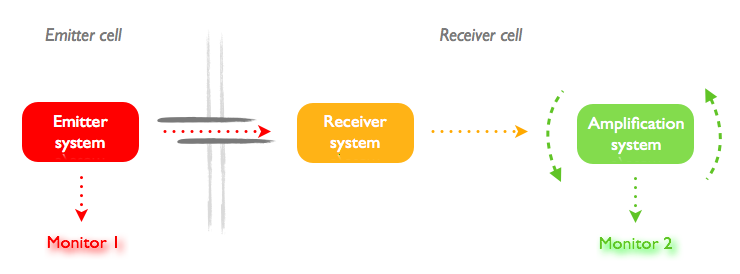Team:Paris Bettencourt/Designs
From 2011.igem.org
(→Step 2) |
(→Designs for step 1) |
||
| Line 12: | Line 12: | ||
The principle of the step 1 is to characterize the nanotube communication. The idea is to pass molecules of different sizes and monitor the increase of time between the apparition of the two monitors because of the nanotube diffusion time. | The principle of the step 1 is to characterize the nanotube communication. The idea is to pass molecules of different sizes and monitor the increase of time between the apparition of the two monitors because of the nanotube diffusion time. | ||
| - | [[File:Step1_principle.jpg | + | [[File:Step1_principle.jpg|thumb|center|upright=3.0|General plan of Step 1]] |
First you put the two construction in the same cell, and you induce with different quantities of IPTG. Then you measure the time between the apparition of the monitor 1 (RFP) and the monitor 2 (GFP). You reproduce a second time the experiment, but with the two construct inside two differents cells. The increase of the time is due to the diffusion time through the nanotubes. | First you put the two construction in the same cell, and you induce with different quantities of IPTG. Then you measure the time between the apparition of the monitor 1 (RFP) and the monitor 2 (GFP). You reproduce a second time the experiment, but with the two construct inside two differents cells. The increase of the time is due to the diffusion time through the nanotubes. | ||
Revision as of 12:15, 6 July 2011
Here is the design page, in wich is sum up all the potential designs we may do designs. This page is private for the moment, but it may become available on the open wiki soon.
Contents |
Designs for step 0
We currently have 2 designs for the step 0:
- The Antibiotics resistance experiences
- The GFP-LacI fusion
Designs for step 1
The principle of the step 1 is to characterize the nanotube communication. The idea is to pass molecules of different sizes and monitor the increase of time between the apparition of the two monitors because of the nanotube diffusion time.
First you put the two construction in the same cell, and you induce with different quantities of IPTG. Then you measure the time between the apparition of the monitor 1 (RFP) and the monitor 2 (GFP). You reproduce a second time the experiment, but with the two construct inside two differents cells. The increase of the time is due to the diffusion time through the nanotubes.
We expect the time to increase with the size of the molecule as the diffusion coefficient is in D = K/R where K is a constant and R the Stoke radius.
We have two different familly of designs depending on the type of amplifier used for detecting the signal. There can be non reversible amplifiers (T7 self amplifier) and reversible amplifiers, in which the property of reversibility is not exploited (Toggle Switch). Here are the designs classified by amplifier types.
Non reversible amplifiers
- The T7 diffusion: The principle of this experiment is to pass T7 through the nanotubes, this T7 activating the T7 amplivier in the receptor cell.
- The tRNA amber suppressor diffusion: The principle of this design is to produce in one cell a tRNA amber supressor that will diffuse through the nanotubes. On the receptor cell, a T7 with amber stop codon is there to activate the T7 self amplifier, but cannot be transcribed as long as the tRNA amber suppressor is not there in the cell.
- The Xis protein diffusion: Xis is tha small partner of an exisase. This will exise a stop codon on the DNA strand that prevent the expression of the GFP.
Potentially reversible amplifier
- The CI(ind) diffusion: The indestructible CI diffusion will change the toogle switch state
- The RecA* diffusion: The RecA diffusion will help the change of the toogle switch state
Two copoment system designs (for. B. Subtilis - E. Coli systems only)
- The MBP diffusion
- The OmpR diffusion
Step 2
The principle of Step 2 is to build a Master-Slave system, where the Master slave control the state of the Slave cell in a monodirectional exchange.
There are several possibility of designs and they are sum up below:
 "
"
